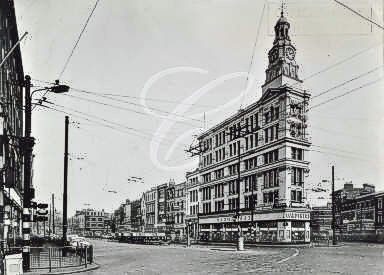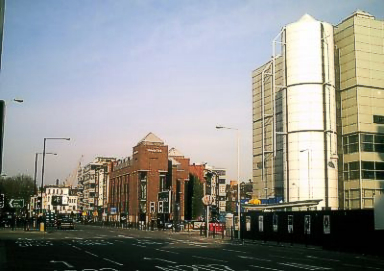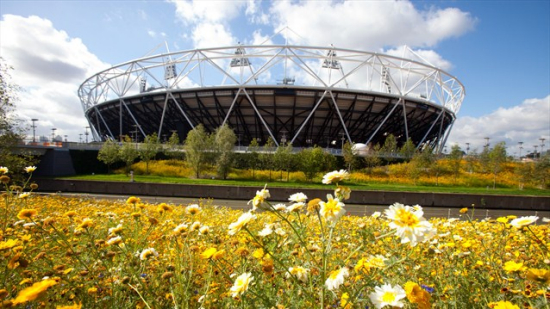
Gardiners Corner then |

Gardiners Corner today |
Down Memory Lane In
London’s Olympic Village
BY IVOR DAVIS
NOWN for its cutting-edge
bars, offbeat galleries and ethnic restaurants, East London
is by far the city’s trendiest area." So trumpeted The
New York Times in April.
I was pleasantly amused when I
read the story touting the delights of the East End on the
eve of the summer’s Olympics.
Was this the same very Jewish East
End (Hackney, Whitechapel, Stratford) where I spent the
first 21 years of my life? Was this the trendy, glossy chic
neighborhood and the place I spent two decades trying to
escape from?
I was born in Whitechapel’s London
Hospital July 27, l938 (July 27 happens to be the 2012
Olympic opening ceremonies). During the London blitz, along
with many of our neighbors, my parents and siblings spent
many a night in our back garden Anderson bomb shelter or
crowded into a three-room house not far from the very smelly
River Lea.
After the war we were weaned on
ration books, powdered eggs and cod liver oil, as the
devastated nation pulled it self together after Werner Von
Braun’s rockets had flattened chunks of London town.
My baker father Oscar used
to walk five miles from Hackney to Brick Lane at 3 a.m.
because there were no buses and we didn’t have a car, to
make bread at Bernstein’s Bakery. So at least we didn’t
starve. Does it sound too Dickensian to say we always had a
crust on our table?
I wasn’t unhappy exactly. It was
just a struggle. Everything was drab and dingy. Grey was
the predominant color of the landscape and blinding fog
coated everything. I went to Hackney Downs Grammar School
(students included Harold Pinter and Michael Caine).
For occasional treats I was taken to the Palais Yiddish
Theater on Commercial Road.
TV then was the territory of the
privileged. Radio was our showbiz diet, with a cheeky comic
named Tommy Handley who it turned out was an
unknowing precursor of Twitter. "TTFN" he would tell his
listeners: "Ta Ta For Now."
I played weekly soccer on the
primitive Hackney Marshes (freezing shed dressing rooms, no
water, carry and erect your own goalposts) or for London's
well known Jewish team Wingate and represented first England
and then the USA in the World Maccabiah Games. But in l960
(after two gallant years in the Royal Army Medical Corps
stationed at the Queen Alexandra Medical Hospital in
Millbank, next door to the Tate Gallery) it was my time.
After my 21st birthday
I fled to Los Angeles seeking sun and a new life.
Meanwhile the cost of living
in fashionable London was zooming and adventurous souls were
moving first to Islington (like Tony Blair) and
setting up home in places like Shoreditch, Hoxton or
Dalston. Even (gulp) Hackney.
Now the prestigious New York
Times notes that Ralph Fiennes, Keira Knightly
and all manner of celebrities, writers and artists proudly
call home a community now brimming with culture, food and
maybe even paparazzi.

Olympic Stadium 2012 |
For us East Enders circa the
fifties, the pinnacle of shopping wasn’t trendy clothing
from Alexander McQueen (an East Ender by the way) or
Stella McCartney, but a semiannual trip to the
Gardiner's Corner store for a new shirt. In l936 Gardiners
Corner was a notorious battleground as local Jews repelled
Oswald Moseley, the pro-Hitler fascist. The store is
gone to make way for giant financial buildings.
Cuisine was a word not in our
lexicon If you wanted a food treat it meant a trip to
Johnny Isaacs Fish and Chips opposite the Salvation Army in
Whitechapel, or a journey to Bloom’s deli in Aldgate for
their world famous kosher corned beef and their
inevitably rude waiters.
A sophisticated and adventurous
evening out was a drive from Hackney Boys Club to Heathrow
Airport in the club leader’s car. We cavalierly ordered a
coffee as we watched the takeoffs and landings.
Or sometimes we hopped on the 38
bus to Piccadilly where you could dine in grander style in
one of innumerable Italian holes in the wall—our idea of an
ethnic restaurant. An indifferent spaghetti bolognaise (now
that was what you called cuisine!) and a glass of wine set
you back all of 65 cents.
Times, of
course, are obviously changing—dramatically.
Another of my stomping
grounds—Stratford, the once seedy and neglected London
suburb where I began my journalism journey in the late
fifties as a reporter on the now defunct weekly Stratford
Express—has been dramatically transformed as the
magnificent centerpiece for the Olympics. Amazing what you
can do with a mere $1.6 billion.
The nearest playing field was the
odorous environs of the Beckton Gasworks, which reeked
morning, noon and night of—well, gas. But never in anyone’s
wildest dreams could you ever imagine Stratford with an
Olympic Stadium and Village which will have restaurants
serving food from around the world.
There was, however, one cultural
gem amidst the mundane. We walked around the corner to the
Theater Royal Stratford where producer Joan Littlewood
ruled with a series of innovative plays. I wonder if Joan
ever imagined that she would be the forerunner of an East
End inhabited by "luvvies," as the showbiz crowds were
sometimes called.
I recall East End used to export
its best talent west--to the posher theaters when they made
it big. Now the traffic is going this way.
Pity the late Jewish
lyricist-composer Lionel Bart is not around to see
what time has wrought.
His first big hit was the musical
Fings Ain’t Wot They Used T’Be. And Mr. Bart most
certainly would have relished updating that piece of work.